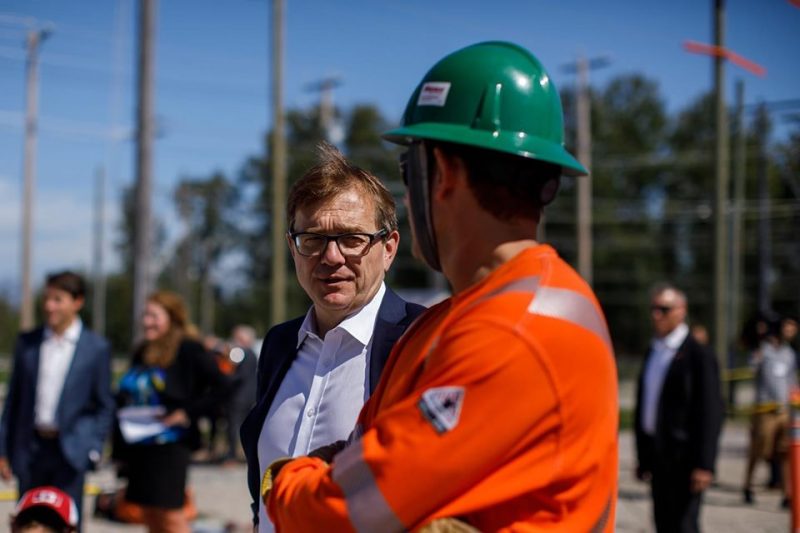It’s not about wild first, it’s about votes first
Where is the application of the precautionary principle to protect wild salmon when it comes to the Trans Mountain oil pipeline expansion project?
Commentary
By Fabian Dawson
SeaWestNews
The new Liberal political policy plank to transition all open-net fish farms in British Columbia to land-based facilities by 2025 is both poached and baked.
Largely copied from the NDP and the Greens, this policy is reckless and destructive because there is no proven feasible technology existing for such a large land based transition at this time.
Underlining the sudden announcement by the Justin Trudeau-led Liberals is a desperate attempt to get urban votes at the expense of rural livelihoods.
Look a little deeper and you will find that this Liberal political policy is not only poached but is baked with hypocrisy.
Federal Fisheries Minister Jonathan Wilkinson, who has all along pledge that any government policy on this matter will be backed by science-based decision making, is now applying the “precautionary principle” for his about-face.
He tells Canadian Press the campaign promise reflects a precautionary approach to a divisive issue in B.C. over the protection of wild salmon.
“I believe we can get there,” said Wilkinson, the Liberal candidate in the North Vancouver riding. “The technology certainly exists. We have a number of years in front of us to get to that point and I think we will, with goodwill on all sides, be able to get there.”
Wilkinson has also pre-empted the work of an on-going scientific study by his own people, industry and Indigenous groups, claiming that it is reasonable to assume the study was heading toward supporting closed containment.
That is not exactly true.
A draft copy of the study by the technical working group to continue fostering innovation in ocean farming in B.C., concludes that ‘the new technologies discussed in this report, as well as conventional net pen systems, will all play a role in contributing to global production of salmon products’
When it comes to the application of the precautionary principle to protect wild salmon, the Liberals are at best selective.
The Liberals bought the controversial Trans Mountain oil pipeline expansion for $4.5 billion last year to overcome opposition to the project.
There have been several reports characterising the risks posed to wild salmon by a Trans Mountain pipeline spill into the Lower Fraser River or a tanker spill into the Salish Sea.
“With nine species of salmon and trout spawning in the tributaries of the Lower Fraser River and using the main channels and sloughs to rear, a spill of diluted bitumen into the river or its tributaries would be catastrophic, rendering many of these areas unsuitable for the growth and survival of salmon embryos and fry,” states the Raincoast Conservation Foundation.
“If the government of Canada does build the Trans Mountain pipeline, it must do so knowing this decision clearly jeopardises Canada’s greatest salmon river and a fish considered the lifeblood of British Columbia,” the group states.
So where is the application of the precautionary principle when it comes to the pipeline?
Farm-raised salmon is B.C.’s highest valued seafood product, the province’s top agricultural export, and generates over $1.5-billion towards the B.C. economy, resulting in about 7,000 jobs.
The industry abides by stringent environmental regulations and has earned third-party environmental certifications for virtually every farm in B.C.
The open-net salmon debate, steeped in politics and hijacked by social-media savvy eco-activists, has been raging for more than two decades on the West Coast.
Despite apocalyptic projections that salmon farms will decimate all wild salmon stocks on the West Coast, nothing of the sort has happened.
These extinction reports, many by foreign funded NGOs, use simplistic notions, to push the assumption that removing salmon farms from coastal B.C. waters will save wild Pacific salmon, which it will not.
The bottom line is that there is no credible scientific evidence to show that fish farms are causing wild salmon declines.
The Justin Trudeau-led Liberals have become victims of the eco-hype that time and again has been shown to be inconsistent with the science of open-net salmon farming.
The application of the precautionary policy on B.C’s sustainable salmon farming industry and not for the Trans Mountain oil pipeline expansion project tells Canadians one thing.
It’s not about wild first, it’s about votes first.
(Jonathon Wilkinson Facebook photo)

